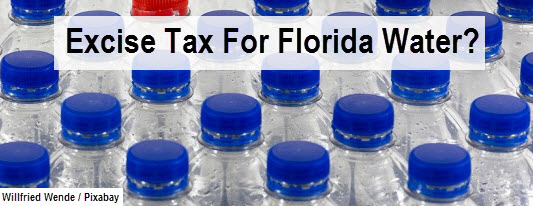Florida's Proposed First-In-Nation Water Excise Tax Bottled Up By Legal - Procedural Questions
Posted January 22, 2020 06:05 am

TALLAHASSEE, FL –
A proposal to impose a first-in-the-nation
excise tax on companies extracting water
from Florida aquifers was postponed Tuesday
to resolve constitutionality questions and
address industry objections.
Sen. Anne Taddeo’s Senate Bill 1112 Tuesday
survived an attempt before the Senate
Commerce & Tourism Committee to replace the
tax with penalties, but could not advance
without clarifying if it needs a two-thirds
vote in both chambers and violates the 1972
Florida Water Resources Act, which declares
springs, rivers and lakes state property but
does not have a provision for setting a
price on its extracted value.
“We have a lot of work to do,” Taddeo,
D-Miami, said. “This is a conversation we
absolutely need to have.”
SB 1112 would slap a 12.5 cent per gallon
tax on extracted water with revenues
dedicated to the state’s Wastewater
Treatment & Stormwater Management Revolving
Loan Trust Fund.
Taddeo said state water policies, unchanged
since the 1990s, are exploited by
corporations “making a tremendous amount of
money” while paying as little as $115 for
consumptive use permits (CUPs) granted by
the state’s five water management districts.
“Our state imposes extraction taxes on oil,
gas and other minerals but we do not impose
taxes on our most valuable, precious
resource – water,” she said. “Water is
Florida’s oil.”
Committee chair Sen. Joe Gruters,
R-Sarasota, the state GOP chair, called the
12.5 cent per gallon levy “a massive tax
increase” and proposed replacing it with a
12.5 cent penalty per gallon above amounts
allowed in CUPs.
Gruters said SB 1112 was “probably good
public policy” but a tax is “going to be
very tough” to approve.
“This bill will fundamentally change Florida
law. It would be the first of its kind in
the United States to impose a fee on
extracted water,” he said.
Gruters’ amendment failed, but panel members
acknowledged concern about the measure’s
legality in meeting the one-topic
requirement, among other issues.
The bill is supported by environmental
interests, including Sierra Club Florida and
the Florida Springs Council.
“This bill provides a market mechanism to
protect against over-use,” Sierra Club
Florida’s Dave Cullen said, calling for a
CUP moratorium until regulations are updated
Florida Springs Council’s Ryan Smart said
state waters “are already significantly
overdrawn. There is no evidence of exceeding
(CUPs) because the permit system isn’t
working.”
The bill is opposed by business groups,
including Associated Industries of Florida
and Nestlé Waters North America.
Nestlé has contracted with Seven Springs
Water Co., which has a pending five-year
permit renewal before the Suwannee River
Water Management District to extract 1
million gallons daily from Ginnie Springs.
Nestlé spokesman Lane Stevens said “contrary
to social medial speculation, 95 percent of
the water bottled in Florida is sold and
used in Florida.”
He said Nestlé employs more than 920
Floridians with an annual payroll of $52
million and pays $7 million in taxes to
local governments.
“No other state in the country has concluded
it is in that state’s best interest to tax
water. If adopted, water production will
shift out of Florida,” Stevens said, noting
Nestlé would pay more in taxes than in
wages. “I don’t think there is any other
business in Florida that pays more in taxes
than its payroll.”
Taddeo’s bill is among a bevy of proposed
water-extraction legislation, including a
House companion, House Bill 861, filed by
Rep. Matt Willhite, D-Wellington; SB 1798,
filed by Sen. Rob Bradley, R-Fleming Island,
to require a specified fee for CUPs granted
to water bottlers; and SBs 1096 and 1098,
filed by Sen. Janet Cruz, D-Tampa, requiring
CUPs be state-monitored and levy a 5 cent
per gallon surcharge.
-------------------------------
This piece appeared in the The Center Square and was reprinted by the Columbia County Observer with permission or license.
Layout and graphics added by the Observer

 By
John Haughey | The Center Square
By
John Haughey | The Center Square